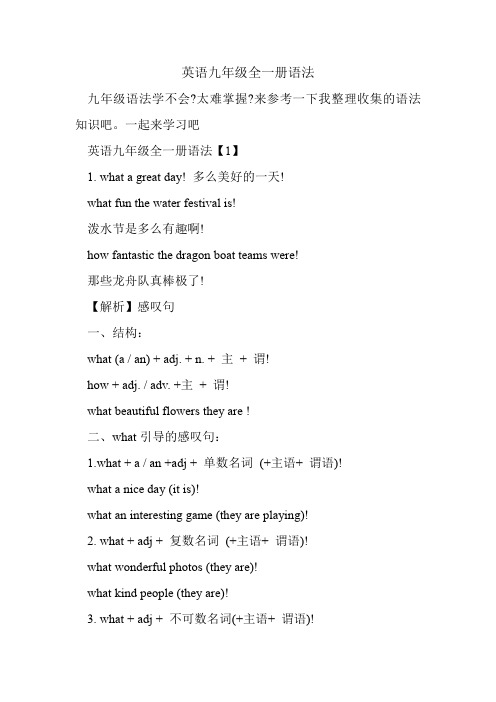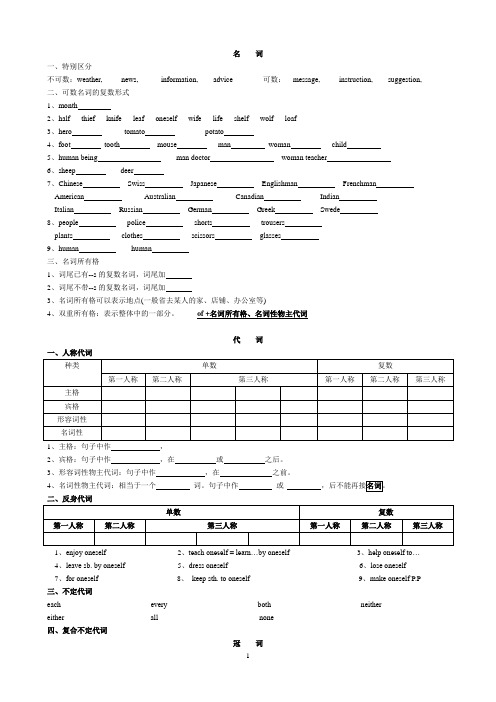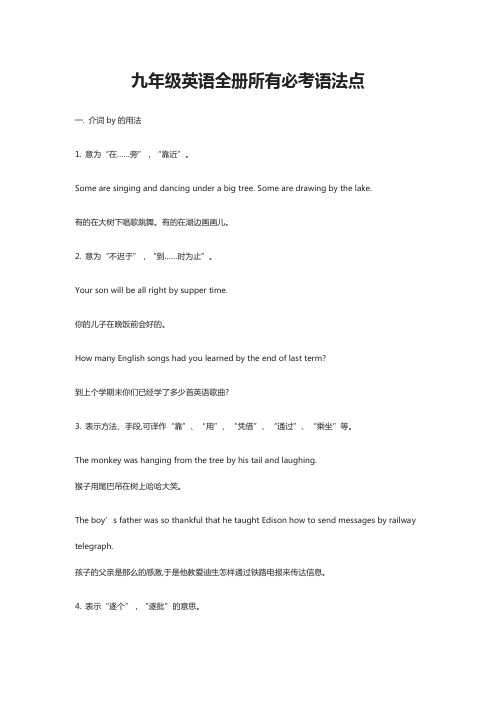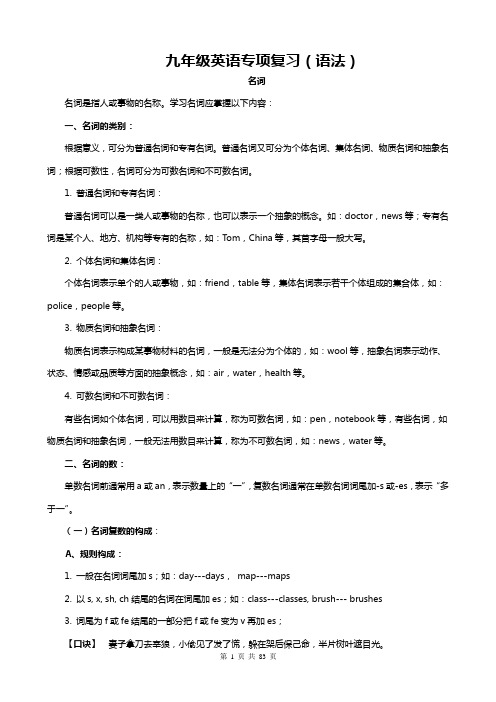九年级英语语法总复习专用
英语九年级全一册语法.doc

英语九年级全一册语法九年级语法学不会?太难掌握?来参考一下我整理收集的语法知识吧。
一起来学习吧英语九年级全一册语法【1】1. what a great day! 多么美好的一天!what fun the water festival is!泼水节是多么有趣啊!how fantastic the dragon boat teams were!那些龙舟队真棒极了!【解析】感叹句一、结构:what (a / an) + adj. + n. + 主+ 谓!how + adj. / adv. +主+ 谓!what beautiful flowers they are !二、what引导的感叹句:1.what + a / an +adj + 单数名词(+主语+ 谓语)!what a nice day (it is)!what an interesting game (they are playing)!2. what + adj + 复数名词(+主语+ 谓语)!what wonderful photos (they are)!what kind people (they are)!3. what + adj + 不可数名词(+主语+ 谓语)!_______ bad weather (it is)!what nice food (he cooks)!三、how引导的感叹句:1.how + adj / adv + 主语+ 谓语!how nice he is!how beautiful the flowers are!2.how + adj + a / an + 单数名词(+主语+ 谓语)!how tall a boy (he is )!how nice a song (she is singing)!3.how + adj / adv + the + 名词+ 谓语!how tall the boy is!how fine the day is!4、what 与how引导的感叹句之间的转换:1.what a beautiful girl she is != ______ beautiful the girl is !2.how delicious the food is != ______ delicious food it is !2.the dragon boat festival in hong kong 香港龙舟节【解析】介词in表地点in用于较大的地点前,如大城市、国家、洲等。
初三英语总复习语法讲义

名词一、特别区分不可数:weather, news, information, advice 可数:message, instruction, suggestion,二、可数名词的复数形式1、month2、half thief knife leaf oneself wife life shelf wolf loaf3、hero tomato potato4、foot tooth mouse man woman child5、human being man doctor woman teacher6、sheep deer7、Chinese Swiss Japanese Englishman FrenchmanAmerican Australian Canadian IndianItalian Russian German Greek Swede8、people police shorts trousersplants clothes scissors glasses9、human human三、名词所有格1、词尾已有--s的复数名词,词尾加2、词尾不带--s的复数名词,词尾加3、名词所有格可以表示地点(一般省去某人的家、店铺、办公室等)4、双重所有格:表示整体中的一部分。
of +名词所有格、名词性物主代词代词一、人称代词1、主格:句子中作,2、宾格:句子中作,在或之后。
3、形容词性物主代词:句子中作,在之前。
4、名词性物主代词:相当于一个词。
句子中作或,后不能再接二、反身代词1、enjoy oneself2、teach oneself = learn…b y oneself3、help oneself to…4、leave sb. by oneself5、dress oneself6、lose oneself7、for oneself 8、keep sth. to oneself 9、make oneself P.P三、不定代词each every both neithereither all none四、复合不定代词冠词1、such a/an + adj…. so adj. a/an +…2、quite/rather a/an… a very…3、a/an + adj. + 三餐/天气4、a/an +序数词= another… 。
中考英语语法总复习(精华版)

中考英语语法总复习(精华版)Ⅰ词类。
专有名词:表示人名、月份、日期、地名等。
如China, John, London, the USA, Harbin .个体名词:表示单个的人或事物。
如boat, chair, desk, apple .集体名词:表示一群人或一些事物的总称。
如family, people, class, police . 可数名词普通名词物质名词:表示无法分为个体的物质。
如water, air, tea, sea, money, cotton .抽象名词:表示抽象概念的词。
如health, help, work, friendship . 不可数名词 2.名词的数。
可数名词有单复数,不可数名词没有单复数。
3.名词的格:名词有三个格:主格(作主语)、宾格(作宾语)、和所有格。
其中只有名词的所有格有形式变化。
(二)冠词1.定冠词-the .○1特指某(些)人或某(些)事物。
The students are very good.○2说话人与听话人都知道的人或事物。
Where is the toilet ?○3重复提到上文的人或事物。
I have a cat , the cat is white and black .○4表示世界上独一无二的事物。
The moon moves around the earth .○5形容词最高级和序数词前和表示方位的名词前。
I am the oldest . He is the first to school . I live in the south .○6乐器的名称前常用定冠词-the 。
I like playing the piano / violin .○7和某些形容词连用,使形容词名词化,代表某一类人。
We should help the poor .○8放在某些专有名词前。
We will go to visit the Great Wall next week . the people’s Republic of China .○9放在姓氏的复数形式前,表示全家人或夫妇两人。
九年级英语语法知识点归纳总结

九年级英语语法知识点归纳总结一、宾语从句宾语从句在复合句中作主句的宾语。
三大考点:引导词、时态和语序。
其中,语序必须是陈述句语序。
1. 常由下面的一些词引导:①由that 引导,表示陈述意义,that可省略He says (that) he is at home. 他说他在家里。
②由if , whether引导,表示一般疑问意义(带有是否、已否、对否等)I don’t know if / whether Wei Hua likes fish. 我不知道韦华是否喜欢鱼。
③由连接代词、连接副词(疑问词) 引导,表示特殊疑问意义Do you know what he wants to buy? 你知道他想要买什么吗?2. 从句时态要与主句一致当主句是一般现在时,从句根据情况使用任何时态当主句是一般过去时,从句应使用过去某时态(一般过去时,过去进行时,过去将来时,过去完成时)He said (that) he was at home. 他说他在家里。
I didn’t know that she was singing now. 我不知道她正在唱歌。
She wanted to know if I had finished m homewor k. 她想要知道我是否已经完成了我的作业。
Did you know when he would be back? 你知道他什么时候会回来吗?二、感叹句感叹句是表达喜、怒、哀、乐以及惊奇、惊讶等强烈感情的句子。
感叹句通常由what 或how 引导。
现分述如下:1. 由what 引导的感叹句,其句子结构可分为以下三种:①可用句型:“What +a / an+形容词+可数名词单数+主语+谓语+其他!”。
如:What a nice present it is! 它是一件多么好的礼物啊!②可用句型:“What+形容词+可数名词复数+主语+谓语+其他!”。
如:What beautiful flowers they are! 多么漂亮的花啊!③可用句型:“What +形容词+不可数名词+主语+谓语+其他!”如:What fine weather it is today! 今天天气多好啊!2. 由how 引导的感叹句,其句子结构也分为三种:①可用句型:“How +形容词/ 副词+主语+谓语+其他!”。
仁爱英语九年级全册 语法专练

仁爱英语九年级全册语法专练模块一第一章语法专练现在完成时(І)意义:现在完成时表示过去发生或已经完成的某一动作对现在造成的影响或结果。
肯定句:I __________ (see) the film.否定句:I __________ (not see) the film.一般疑问句:—__________ you__________ (see) the film?—Yes, __________. /No,__________.特殊疑问句:What __________ you __________(see)?注意:① have/has been to+某地,表示“去过某地"。
(说话时人已不在某地)①have/has gone to+某地,表示“去了某地”。
(说话时人还没回来)①have/has been in+某地,表示“已在某地”。
(说话时人没离开过某地)选择填空()1. —Mom,where is my sister?—She ______ the library.A. was going toB. has gone toC. has been to情景交际2. 你想告诉朋友,你很久没有见到Tom了,可以这样说:_____________________________________ Tom for a long time.3. Alice告诉你,她去过福州两次,她可以这样说:_____________________________________ Fuzhou twice.模块一第二章语法专练现在完成时(Ⅱ)现在完成时不可以和明确表示过去的时间状语连用,如:yesterday、last year等。
常与下列副词连用:单项选择( )1.---Have you returned the library book ______?---Yes, I’ve ______ returned it.A.just;alreadyB.yet;yetC.yet;just( )2.---Fred’s father is the boss of the factory.---Is that true? He has ______ told me about it.A.neverB.everC.already模块一第三章语法专练现在完成时(Ⅱ)现在完成时表示从过去某一时刻延续到现在的动作或状态,常与for或since引导的时间状语连用。
九年级英语全册所有必考语法点

九年级英语全册所有必考语法点一. 介词by的用法1. 意为“在……旁”,“靠近”。
Some are singing and dancing under a big tree. Some are drawing by the lake.有的在大树下唱歌跳舞。
有的在湖边画画儿。
2. 意为“不迟于”,“到……时为止”。
Your son will be all right by supper time.你的儿子在晚饭前会好的。
How many English songs had you learned by the end of last term?到上个学期末你们已经学了多少首英语歌曲?3. 表示方法、手段,可译作“靠”、“用”、“凭借”、“通过”、“乘坐”等。
The monkey was hanging from the tree by his tail and laughing.猴子用尾巴吊在树上哈哈大笑。
The boy’s father was so thankful that he taught Edison how to send messages by railway telegraph.孩子的父亲是那么的感激,于是他教爱迪生怎样通过铁路电报来传达信息。
4. 表示“逐个”,“逐批”的意思。
One by>他们一个一个得在黑暗中经过这张桌子。
5. 表示“根据”,“按照”的意思。
What time is it by your watch?你的表几点了?6. 和take , hold等动词连用,说明接触身体的某一部分。
I took him by the hand.我拉住了他的手。
7. 用于被动句中,表示行为主体,常译作“被”、“由”等。
English is spoken by many people.英语被许多人说。
(即“许多人讲英语。
”)二. 动名词(doing)动名词相当于名词,在句子中可以做主语、宾语、表语、定语等。
九年级英语十大必考语法点(适用各个版本)

九年级英语十大必考语法点(适用各个版本)一. 宾语从句1. 宾语从句的含义在整个句子中做宾语的从句叫做宾语从句。
如:She knew that the teacher had seen the film.她知道这位老师看过这部电影。
(“that the teacher had seen the film”做knew 的宾语,同时又是由连接词that 引导的从句,所以它叫做宾语从句。
)2. 宾语从句的分类(1)动词宾语从句:顾名思义,它是位于动词后面的宾语从句。
例如:He asked whose handwriting was the best in our class.他问我们班上谁的书法最好。
(2)介词宾语从句:顾名思义,它是位于介词后面的宾语从句。
例如:I agree with what you said just now.我同意你刚才说的话。
(3)形容词宾语从句:顾名思义,它是位于形容词后面的宾语从句。
例如:I am afraid that I will be late. 恐怕我要迟到了。
3. 引导名词性从句的连接词(1)that:没有含义,在宾语从句中不做成分(2)whether/if:表示是否,在宾语从句中不做成分。
I don't know if /whether he still lives here after so many years. 我不知道这么多年后,他是否还住在这里。
(3)连接代词:what, which, who, whom, whose(在宾语从句中做主、宾、表和定语)连接副词:where, when, how, why(在宾语从句中做状语)The small children don't know what is in their stockings.(what 在宾语从句中做主语)这些小孩子不知道什么在他们的长筒袜里。
Could you tell me why you were late for the meeting this morning?(why 在宾语从句中做原因状语)你能告诉我为什么你今天早上开会迟到吗?4. 在做宾语从句的题目时应注意两点(1)时态①当主句是现在时态时,宾语从句可以根据需要使用任何时态。
九年级英语语法知识点全总结

九年级英语专项复习(语法)名词名词是指人或事物的名称。
学习名词应掌握以下内容:一、名词的类别:根据意义,可分为普通名词和专有名词。
普通名词又可分为个体名词、集体名词、物质名词和抽象名词;根据可数性,名词可分为可数名词和不可数名词。
1. 普通名词和专有名词:普通名词可以是一类人或事物的名称,也可以表示一个抽象的概念。
如:doctor,news等;专有名词是某个人、地方、机构等专有的名称,如:Tom,China等,其首字母一般大写。
2. 个体名词和集体名词:个体名词表示单个的人或事物,如:friend,table等,集体名词表示若干个体组成的集合体,如:police,people等。
3. 物质名词和抽象名词:物质名词表示构成某事物材料的名词,一般是无法分为个体的,如:wool等,抽象名词表示动作、状态、情感或品质等方面的抽象概念,如:air,water,health等。
4. 可数名词和不可数名词:有些名词如个体名词,可以用数目来计算,称为可数名词,如:pen,notebook等,有些名词,如物质名词和抽象名词,一般无法用数目来计算,称为不可数名词,如:news,water等。
二、名词的数:单数名词前通常用a或an,表示数量上的“一”,复数名词通常在单数名词词尾加-s或-es,表示“多于一”。
(一)名词复数的构成:A、规则构成:1. 一般在名词词尾加s;如:day---days,map---maps2. 以s, x, sh, ch结尾的名词在词尾加es;如:class---classes, brush--- brushes3. 词尾为f或fe结尾的一部分把f或fe变为v再加es;【口诀】妻子拿刀去宰狼,小偷见了发了慌,躲在架后保己命,半片树叶遮目光。
wife ---wives, knife---knives, wolf---wolves, thief ---thieves, shelf---shelves, self—selves, life ---lives, half---halves, leaf---leaves还有一部分以f或fe结尾的直接加s;如:roof---roofs,chief—chiefs* scarf---scarfs / scarves4. 词尾为辅音字母+y结尾的,要先把y变成i再加es;如:country---countries,factory---factories,family---families5.词尾为o的一部分加s,一部分加es;如:(1)加-es:两人两菜一水果(*Negro---Negroes,hero---heroes,tomato—tomatoes,potato---potatoes,mango---mangoes)(2 )加-s工作间里有架钢琴,钢琴上有台收音机,收音机旁有幅照片,照片里有动物园,动物园里有竹子。
- 1、下载文档前请自行甄别文档内容的完整性,平台不提供额外的编辑、内容补充、找答案等附加服务。
- 2、"仅部分预览"的文档,不可在线预览部分如存在完整性等问题,可反馈申请退款(可完整预览的文档不适用该条件!)。
- 3、如文档侵犯您的权益,请联系客服反馈,我们会尽快为您处理(人工客服工作时间:9:00-18:30)。
(1).spend spent spent pay paid paid
(1)say said said speak spoke spoken
(2)
(3)
(4)
(5)
(6)
(7)
(8)
useful = of use
(1)
(2)
下
It is +adj +of
此句型中的形容下
5.
A, maybe adv may be “
1.
2.
3.He may be
就不能用
B,everyone
every one
(1)
(2)
C,none
no one
(1)None of us
)
(list en to,hear)一发
强调动作的片刻,常
等连用
)
强调经常看见他玩
and others are
other friends are
9. another +数词
数词
10.比较级中的(1)
(2)Tom 比kate
班级里)
11.all
both 都(两者)none
neither either… or 不是…neither…nor…
(1)
(2)
(3)
(4)
Neither . I like c
Either.
(5)
Neither did I (
12. either… or there be
Neither he nor I go Neither I nor he goes
B,
C,
D,分数,百分数Two thirds of Two thirds of
E, a pair of +
A pair of jeans F,
G, 当each和
做主但语序有所不同,这四个词的时候,只
enough... to , in
主句如果
,if , unless,so
while
when
(1)
(2)
B.when
When I got to
Tom is made to do buy sb sth
I bought Tom a book
be allowed to do sth be told to do sth
be seen to do sth
be asked to do sth
But
nobody
Nobody bu
Except 表示“除了
Besides
之意的词语连用。
I have five other Except for
21.hear 1.
hear of
hear from
e
used to do
be used to do
be used to doing
be used for doing be used as
(1) He used to
(3)The wood
(4)The knife
The knife
(4)He is used to
(5)I use the knife to and he is used to
距…远
阻止某人做某事表示当心的意思
关心,在
(19).
(外貌)或
样的两个句子(21).
matter with you ?
(22).lend … to
(23).ask sb sth
sth
(24.)
he ?
not play football ? / playing football? 27 (1)
look forward to
(2)
(3)
(4)在做…有困难
(5)
28.need 的用法
(1)need to
是物或事
(2)need to do
(3) need
中
(4)回答
Yes , he must (3)肯定的推测用go bad
he?
也不"
He is not a bit tired.
34 lie lied lied lying lie lay lain lying (1)lie 后可接in (接壤)to (
35.
in surprise 惊喜地
be mad at 对be angry at/about be angry with
be strict with sb be strict in sth
be busy with
be crowded with be worried about sleepy 要睡着的,
It is Tomˋ
(3)英语中”虽然…以表达.
(5)make room for 可以加s
(6)pretend to do sth
(9)remind sb of sth
(10)most of +the
事去帮助别人.
36 too much
too many
much too
是key/
r在加ed,并且不
是有动词,后接人称代词的时
等。
(2) have sth to do
(3)
一.反译疑问句1.
2.
部分应用
时候
(
句部分用it
的不定代词的时候,上3题)
3.
常见的后缀有(-less sth )
4.
1.
not you ?都可以Come in please,
2.
3.
we 的形式.
5祈使句是there be 结构.
6.
①主语是第一人称suppose , guss
如下:
how ,具 it si !
并
are in China.
先行词有
2.
①
together
Together.
② This is the room
③
Is this book
A.
tell, wonder (
大家掌握好:
①.
②
时态
③.
但是应该注意的是
the sun.
④could you ....+
could
注意使用,
B.
①
常可以省略.
②
whether
I asked Tom.
I asked Tom ③
I know. 五.
never, ever, so far , 最近),already , yet
B. 定冠词的用法
1.
2.
3.
4.
5.the +姓+s
6.
7.
8.方位和乐器名词前in the east
9.
in the desk , by the time 等等
1.
①
②
2.
词(your , my
修饰
3.
①
②
4.
5.
7.
day and night 日夜并肩 step by step 上下
at home在家
变复数时,
s 时,都要加s
s,
D.
1.
“A+ 比较级
注意:
those 等
词的单数形式,
①
②
③
2.
Which is +
3.“两者之间比较比较级”的结构。
4.表示“越来越级”
的原级”
6.表示“越......
的结构
7.最高级前必须加
7.
高级,A ,8.表示“最......的
9.
10.
要省去。
11.as ...as 和......一样
not as / so ... as
12.。
